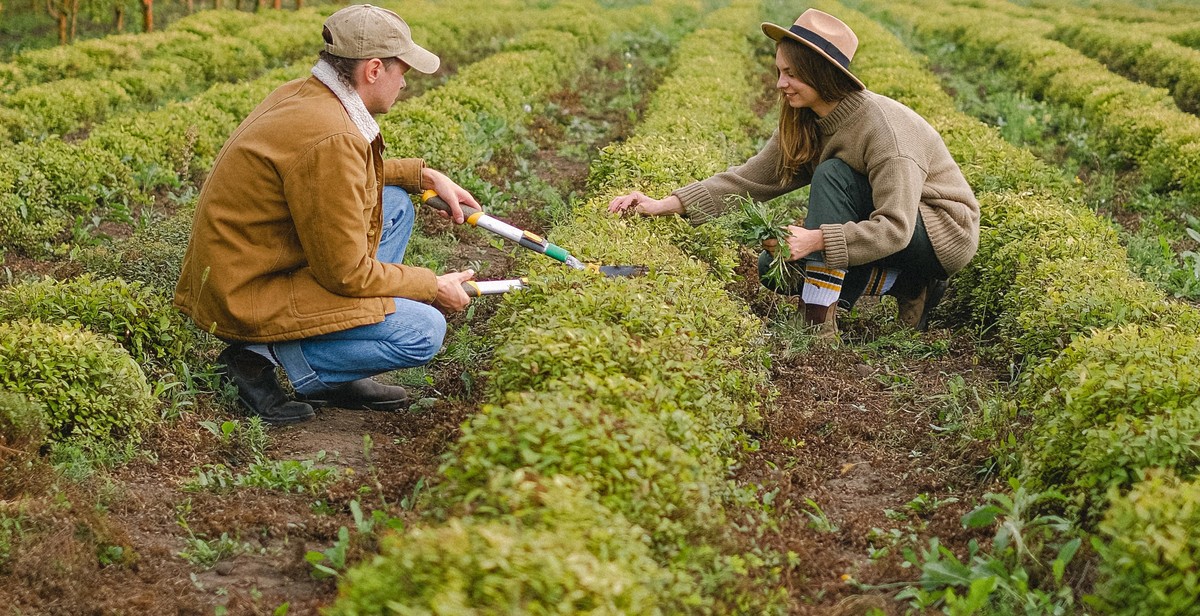How to Create a Sustainable Garden: Eco-Friendly Practices and Organic Gardening
Gardening is a popular hobby that not only provides a source of fresh produce but also offers a relaxing and therapeutic experience. However, traditional gardening practices can have a negative impact on the environment, from the use of pesticides and synthetic fertilizers to the depletion of natural resources. Sustainable gardening, on the other hand, aims to minimize the negative impact on the environment while still producing a bountiful harvest.
What is Sustainable Gardening?
Sustainable gardening is a method of gardening that prioritizes environmental health and conservation. It involves the use of eco-friendly practices that minimize waste and pollution while supporting biodiversity and natural ecosystems. This approach to gardening also emphasizes the use of organic and natural materials, such as compost and mulch, to promote healthy soil and plant growth.
The Benefits of Sustainable Gardening
Sustainable gardening offers numerous benefits, both for the environment and for the gardener. By using eco-friendly practices, sustainable gardening helps to reduce pollution, conserve natural resources, and support biodiversity. Additionally, sustainable gardening can promote healthier soil and plant growth, resulting in a more bountiful harvest and a more enjoyable gardening experience.
In this article, we will explore various eco-friendly practices and organic gardening techniques that can help you create a sustainable and environmentally-friendly garden.

What is Sustainable Gardening?
Sustainable gardening is an eco-friendly approach to gardening that aims to minimize the negative impact on the environment while promoting the growth of healthy plants. It involves using organic and natural methods to maintain soil fertility, conserve water resources, and reduce the use of harmful chemicals.
Sustainable gardening is a holistic approach that takes into account the entire ecosystem of the garden, including the soil, plants, animals, and humans. It involves creating a balanced and diverse environment that supports the growth of healthy plants and promotes biodiversity.
Defining Sustainable Gardening
Sustainable gardening involves a range of practices that are designed to reduce the impact of gardening on the environment. Some of the key practices include:
- Using organic and natural fertilizers and pest control methods
- Composting and recycling garden waste
- Conserving water resources through efficient irrigation systems and rainwater harvesting
- Planting native and drought-tolerant plants
- Creating habitats for beneficial insects and wildlife
By adopting these practices, sustainable gardeners can reduce the use of harmful chemicals and synthetic fertilizers, conserve water resources, and create a healthy and diverse ecosystem in their garden.
Benefits of Sustainable Gardening
There are numerous benefits to sustainable gardening, including:
- Reduced environmental impact: Sustainable gardening practices help to reduce the negative impact of gardening on the environment by minimizing the use of harmful chemicals and synthetic fertilizers.
- Improved soil health: By using organic and natural fertilizers and compost, sustainable gardeners can improve the health and fertility of their soil.
- Biodiversity: Sustainable gardening promotes biodiversity by creating habitats for beneficial insects and wildlife.
- Water conservation: Sustainable gardening practices such as rainwater harvesting and efficient irrigation systems can help to conserve water resources.
- Healthier plants: By using natural and organic methods, sustainable gardeners can promote the growth of healthier and more resilient plants.
Sustainable gardening is a rewarding and fulfilling approach to gardening that promotes a healthy and sustainable environment for future generations.

Eco-Friendly Practices in Sustainable Gardening
Gardening is a great way to enjoy the outdoors, connect with nature, and grow your own food. However, traditional gardening practices can be harmful to the environment. Fortunately, there are eco-friendly practices that you can adopt to make your garden more sustainable.
Composting
Composting is the process of turning organic waste into nutrient-rich soil. By composting, you can reduce the amount of waste that goes to landfills and create a natural fertilizer for your garden. Composting is easy and can be done in a small space. You can compost food scraps, yard waste, and even paper products. Just make sure to avoid composting meat, dairy, and oily foods as they can attract pests.
Rainwater Harvesting
Rainwater harvesting is the practice of collecting rainwater and reusing it in your garden. By doing this, you can reduce your reliance on municipal water and conserve water resources. To harvest rainwater, you can install a rain barrel or a cistern. You can use the collected water to water your plants, wash your tools, and even flush your toilet.
Using Native Plants
Using native plants in your garden is a great way to support local ecosystems and reduce the need for pesticides and fertilizers. Native plants are adapted to your local climate and soil, making them more resistant to pests and diseases. They also provide food and habitat for local wildlife. When choosing native plants, make sure to select species that are appropriate for your soil type and sun exposure.
Natural Pest Control
Natural pest control is the practice of using natural methods to control pests in your garden. This can include using companion planting, beneficial insects, and natural repellents. Companion planting is the practice of planting certain plants together to repel pests or attract beneficial insects. Beneficial insects, such as ladybugs and praying mantises, can help control pests by eating them. Natural repellents, such as garlic spray and neem oil, can help repel pests without harming beneficial insects.
By adopting these eco-friendly practices, you can create a sustainable garden that is both beautiful and beneficial to the environment.

Organic Gardening
Organic gardening is a sustainable and eco-friendly way of growing plants that promotes healthy soil, plants, and ecosystems. By avoiding the use of synthetic chemicals and pesticides, organic gardening helps to reduce the negative impact of conventional gardening practices on the environment and human health.
Benefits of Organic Gardening
Organic gardening has numerous benefits, including:
- Reducing exposure to harmful chemicals
- Improving soil health and fertility
- Promoting biodiversity and natural pest control
- Producing healthier and more nutritious crops
- Reducing carbon footprint and environmental impact
Organic Soil Management
Organic soil management is the foundation of organic gardening. It involves using natural methods to improve soil health and fertility, such as:
- Adding organic matter, such as compost or manure
- Using cover crops to prevent erosion and add nutrients
- Avoiding tilling to preserve soil structure and reduce carbon emissions
- Maintaining a proper pH balance
Organic Fertilizers
Organic fertilizers are made from natural sources and provide plants with essential nutrients without the use of synthetic chemicals. Some examples of organic fertilizers include:
- Compost
- Blood meal
- Bone meal
- Fish emulsion
- Kelp meal
Organic Pest Control
Organic pest control involves using natural methods to prevent and manage pests and diseases, such as:
- Encouraging natural predators, such as ladybugs or praying mantises
- Using companion planting to deter pests
- Using physical barriers, such as row covers or netting
- Using natural sprays, such as neem oil or garlic spray
| Organic Gardening | Conventional Gardening |
|---|---|
| Avoids synthetic chemicals and pesticides | Uses synthetic chemicals and pesticides |
| Improves soil health and fertility | Degrades soil health and fertility |
| Promotes biodiversity and natural pest control | Reduces biodiversity and relies on chemical pest control |
| Produces healthier and more nutritious crops | Produces crops with lower nutritional value and higher chemical residues |
| Reduces carbon footprint and environmental impact | Increases carbon footprint and environmental impact |

Creating a Sustainable Garden: Eco-Friendly Practices and Organic Gardening
A sustainable garden is not only beautiful but also a productive and eco-friendly space that contributes to the health of the planet. By following a few simple principles, you can create a garden that is both sustainable and organic. Here are some tips to get you started:
Choosing the Right Plants
One of the most important aspects of creating a sustainable garden is choosing the right plants. Native plants are a great choice because they are adapted to the local climate and require less water, fertilizer, and maintenance. Look for plants that are drought-tolerant and disease-resistant, as these will require less care and attention.
When selecting plants, consider their role in the ecosystem. Choose plants that attract pollinators, such as bees and butterflies, and provide food and shelter for birds and other wildlife. Avoid invasive species that can harm the environment and take over your garden.
Designing Your Garden
The design of your garden can also play a big role in its sustainability. Consider creating a rain garden to capture and filter rainwater, or install a drip irrigation system to conserve water. Use natural materials, such as wood chips and mulch, to suppress weeds and retain moisture in the soil.
Plant your garden in a way that maximizes sunlight and airflow, and group plants together based on their water and sunlight needs. This will help you conserve resources and reduce the amount of maintenance required.
Maintenance Tips
Maintaining a sustainable garden requires a little extra effort, but the benefits are well worth it. Use organic fertilizers and pest control methods to avoid harmful chemicals, and compost your yard waste to create nutrient-rich soil.
Water your garden deeply and infrequently, and only when necessary. Use a rain gauge to track rainfall and adjust your watering schedule accordingly. Regularly prune and deadhead your plants to encourage healthy growth and minimize the risk of disease.
By following these simple tips, you can create a sustainable garden that is both beautiful and eco-friendly. With a little effort and attention, you can enjoy a bountiful harvest and contribute to the health of the planet.

Conclusion
Gardening is not only a great way to spend time outdoors, but it can also be a sustainable and eco-friendly activity. By implementing the practices mentioned in this article, you can create a garden that is not only beautiful but also beneficial for the environment.
Starting with choosing organic and non-toxic products, you can reduce the negative impact of chemicals on the soil, water, and wildlife. Composting and mulching can improve soil health and reduce waste, while planting native and pollinator-friendly plants can support local ecosystems.
It is also important to conserve water and energy in your garden by using efficient irrigation systems and choosing plants that are adapted to your climate. By reducing your garden’s carbon footprint, you are making a positive impact on the environment and contributing to a more sustainable future.
Remember that creating a sustainable garden is a continuous process, and every small action counts. By educating yourself and others on eco-friendly gardening practices, you can inspire positive change in your community and beyond.
So, start your journey towards a sustainable garden today and enjoy the benefits of a beautiful and thriving outdoor space that is in harmony with nature.
